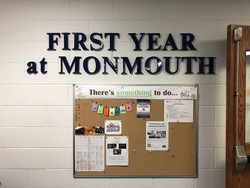University Faculty voted to remove First Year Seminar from the General Education Requirements, effective Fall 2020. This decision came as a result of Monmouth’s graduation requirement being lowered from 128 to 120 credits, necessitating a cutback of courses to meet this new minimum.
The decision to discontinue First Year Seminar was relatively devisive last week. Out of the total 239 faculty votes, 142 members voted to remove the course, 75 to retain, and 22 abstained from the vote entirely.
When the decision was carried out to reduce the amount of necessary graduation credits, General Education Requirements such as Technological Literacy, Reasoned Oral Discourse, and ultimately First Year Seminar were considered to be discontinued in order to meet these new demands.
According to Marina Vujnovic, Ph.D., Chair of the Faculty Council and an Associate Professor of Communication, First Year Seminar was eventually chosen to receive a vote on its ongoing status. “Over the course of the years that faculty taught those courses, there were several ideas and proposals that were brought to attention at the time,” Vujnovic said. “Some called for a revised seminar, as certain faculty felt it didn’t really do what the ‘19C’ intended it to do.”
Referenced internally by Monmouth faculty as document “19C,’ the 2008 Monmouth University Approved General Education Curriculum Reform detailed an outline for the intentions of First Year Seminar.
 “The course is intended to encourage meaningful contact with faculty over a range of issues bearing on ethics and student success,” read the third line of the document’s rationale of the course. “The course is designed and intended to socialize students into academic culture and its core values.”
“The course is intended to encourage meaningful contact with faculty over a range of issues bearing on ethics and student success,” read the third line of the document’s rationale of the course. “The course is designed and intended to socialize students into academic culture and its core values.”
As time went on and different First Year Seminar courses began to evolve, there appeared to be a disparity between the original intentions of the programs and the end results, Vujnovic explained.
“Based on the decisive vote, Faculty Council felt the inconsistency of student experience and academic rigor showed there were issues across sections,” Vujnovic said. “Yes, some sections were challenging and rigorous, but some potentially, based on conversations with faculty, were more perpetuating high school level behavior and work. It wasn’t really doing what we wanted it to do.”
Professors who taught First Year Seminar courses were assisted by Peer Learning Assistants (PLAs), to aid incoming students by answering questions and giving advice regarding their transition to university. Removal of these courses will render PLAs obsolete, and their outlet to provide assistance to first year students in an organized setting will vanish.
Judith Nye, Ph.D., Faculty Director of First Year Seminars and Associate Vice Provost of Academic Affairs for General Education, explained, “The primary role is to be the upper level student who sort of serves as a liaison in the classroom. The role of the PLA develops as a relationship between the professor and the student… when I worked with a PLA, I saw them as my co-teacher.”
Nye added, “They’re always supporting the class, but it’s in varying degrees. It’s based on what the professor and the PLA agreed to. If you talk to different PLAs, you will hear that they play different roles.”
Matthew Pringle, a sophomore homeland security student and current PLA, disagrees with the faculty’s notion that students took advantage of First Year Seminar in order to attend an easier, high school style course.
“Personally, I have noticed students being very receptive and engaged during class time,” Pringle said. “The students, as far as I can tell, are actively engaged and genuinely interested in the class as a whole. It is absolutely a positive addition to not only the student’s schedule, but also to the campus, he said.
Caitlin Mazzela, a senior elementary education student with a concentration in English, is concerned over future first year students’ potential lack of transitional resources. “I feel future students will not have the exposure to older peer mentors as much as they truly need, and they will not be reminded of what the resources on campus can do for them,” she said.
“Who else is going to teach them how to make a tutoring appointment? Their Composition 101 teacher? This is why I have a current petition [to continue First Year Seminar] floating around campus as much as possible for those who agree,” Mazzela continued.
Kenneth Campbell, Ph.D., a Professor of History, teaches a First Year Seminar course on the Beatles. A strong believer in the importance of First Year Seminar, Campbell stated that these courses helped many students adjust to college life, and positively written feedback from student evaluations confirmed these assumptions to be true.
“I will definitely miss teaching First Year Seminar,” Campbell said. “I am saddened and disappointed in the faculty vote eliminating it as a General Education requirement.
“I would like to see the courses survive as elective courses for interested students and Faculty Council stated that this was an option, but I honestly do not know if anyone at the University has the will after the vote to do this,” he continued.
Laura Jannone, an Associate Professor and Coordinator of the School Nurse Program in the School of Nursing & Health Studies, expressed concerns over a future student’s ability to understand certain college-level concepts like proper time management.
“Since I spent time as a school nurse in a high school, I noticed the transition [for a student] from high school to college,” Jannone said.
“Their classes in high school can be 50-90 minute classes depending on their school, and students see their teachers and are told what to do all the time. Now all of a sudden they’re coming to class twice a week. Time management is a major part of the transition and an important skill to learn,” she explained.
There is a strong concern amongst faculty and students alike that future first-year students could feel left out of resources that current undergraduates were fortunate enough to be involved with.
The next phase of new student acclimation is unclear, but Nye has a few ideas.
“We’ll do what we can to shape orientation, knowing that first year seminar doesn’t follow it anymore, and look at other potential first year programs that could supplement or replace,” she said.
“First year student success is a very complicated thing, so if we’re pulling First Year Seminar out, we’ll have to very carefully consider what will go in its place to support our students,” Nye explained.
PHOTO TAKEN by Matthew Cutillo
PHOTO TAKEN by Nicole Riddle


